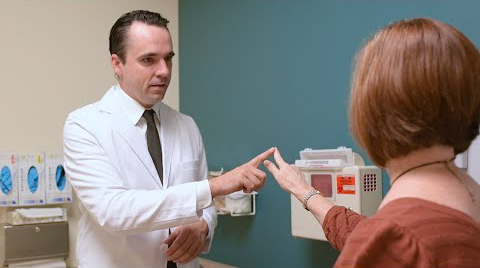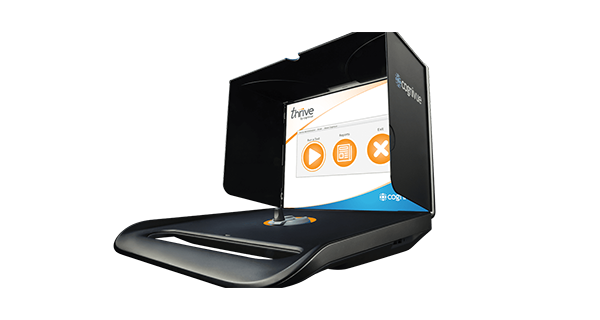Mind Matters: Brain Health Care at Hoag
“…until we find a cure for dementia, we need to keep emphasizing and helping patients and their families adapt to the day-to-day impact of dementia.”
–Dr. Aaron Ritter
It is estimated that by 2024, there will be about 676,000 people above the age of 65 in Orange County, its only growing demographic. “Orange County is ground zero for addressing brain issues that people face over the age of 65,” said Aaron Ritter, MD, Larkin Family Endowed Chair in Integrative Brain Health and director of the Memory & Cognitive Disorders Program at Hoag’s Pickup Family Neurosciences Institute. “When it comes to addressing dementia and cognitive disorders, research has taught us that the biggest impacts come from early and accurate diagnosis. Although we don’t have cures for dementia, having an accurate diagnosis and responding to common issues that emerge can help patients and families adjust to living with these conditions.”
With the support of philanthropy, Hoag has long provided resources that, in addition to clinical care, deliver patient and physician education, tools for screening, and early assessment of memory and cognitive impairment that can lead to dementia and Alzheimer’s disease. Dr. Ritter, a renowned neurobehavioral psychiatrist, joined Hoag in September 2022 to lead its new Center for Integrative Brain Health, which will expand on the resources that Hoag delivers.

Early Diagnosis: Orange County Vital Brain Program
A trademark of Hoag’s roster of resources is the Orange County Vital Brain Program, launched in 2010, within the Memory & Cognitive Disorders Program at the Pickup Family Neurosciences Institute. This unique program, targeting persons over 45 years old, emphasizes early diagnosis by engaging community members, physicians, county organizations, and industry partners. The Orange County Vital Brain Program offers free self-screening tools, accessible on its website, to evaluate, educate, and monitor users on risk factors for cognitive impairment, depression and mood, and memory loss. Identifying risk factors in a patient early leads to earlier treatments and interventions. “This program is unique. Most people are used to getting their vital signs and bloodwork checked during their annual physical. At Hoag, we believe that checking memory and cognition is the fifth vital sign—along with blood pressure, pulse, height, and weight—that should be checked annually,” said Dr. Ritter. “This is an innovative approach to early identification that’s unlike any in the country. It is going to help us identify people at the earliest signs of a problem.”
Cognivue Technology
In spring 2022, Hoag Innovators—a philanthropic group of community leaders dedicated to advancing health care innovation at Hoag through collaborative giving— funded a clinical pilot of cognitive screening technology: Cognivue. It is the first FDA-cleared technology for self-administered computerized assessment, and it can be quickly administered and rapidly analyzed. With the Hoag Innovators’ funding, Hoag was the first in Southern California to implement Cognivue to conduct routine cognitive function screenings across a broad range of neurological disorders. More than 400 people have received neurological assessments with Cognivue through the clinical pilot, and that number is continuing to grow. Devices are being deployed in Hoag’s Epilepsy Monitoring Unit and outpatient Neuropsychological Assessment Clinic, and more are being implemented in Hoag’s emerging Center for Integrative Brain Health, Hoag Medical Group primary care offices, and outpatient neurological clinics.

Comprehensive Care: Center for Integrative Brain Health
In the larger landscape of health care, there is a high number of dementia cases and a low number of dementia specialists. Hoag is creating the Center for Integrative Brain Health to help meet this demand. The center will further expand on Hoag’s existing resources and services to help more of the population maintain, enhance, and treat brain health as they age and support families. “We are attempting to build a comprehensive approach to the brain issues that face individuals over the age of 65,” said Dr. Ritter. With many dementia clinics in the country facing waiting lists that may exceed a year, the Memory & Cognitive Disorders Program at Hoag endeavors to provide patients with quicker diagnoses.
Since the clinic began seeing patients in October 2022, it has seen more than 500 new patients. With philanthropic support, a nurse navigator has also joined the team, providing much-needed guided support for patients and their families. Family and caregiver support is a major component of the center, according to Dr. Ritter, because the health of those individuals can be greatly impacted by the stress of caring for another person.
With increased support, Dr. Ritter sees Hoag as a model of care that focuses on both patient care and clinical research and exploration. “Most of the dementia centers that are in existence are focused almost entirely on clinical research and clinical trials. While research is of crucial importance, until we find a cure for dementia, we need to keep emphasizing and helping patients and their families adapt to the day-to-day impact of dementia. We could lead in that area. Providers at Hoag really focus on putting patients and families first.”
Sign up for our Newsletter